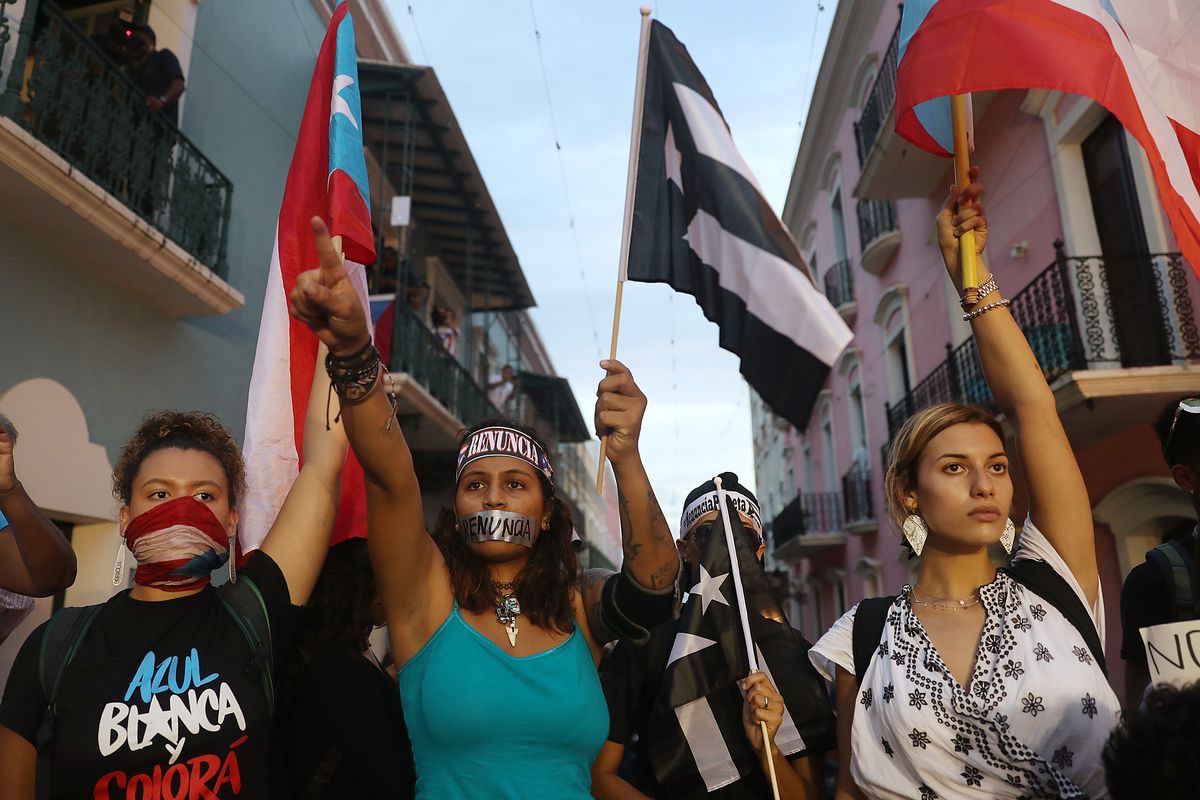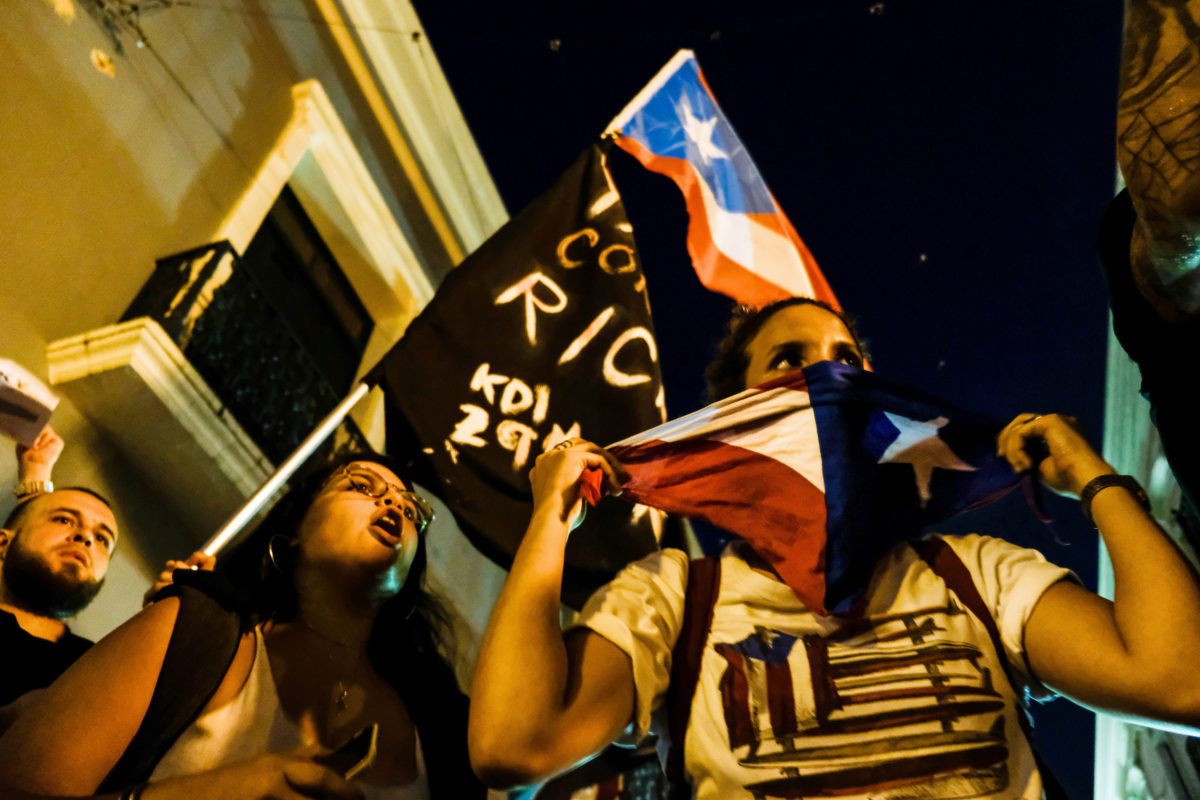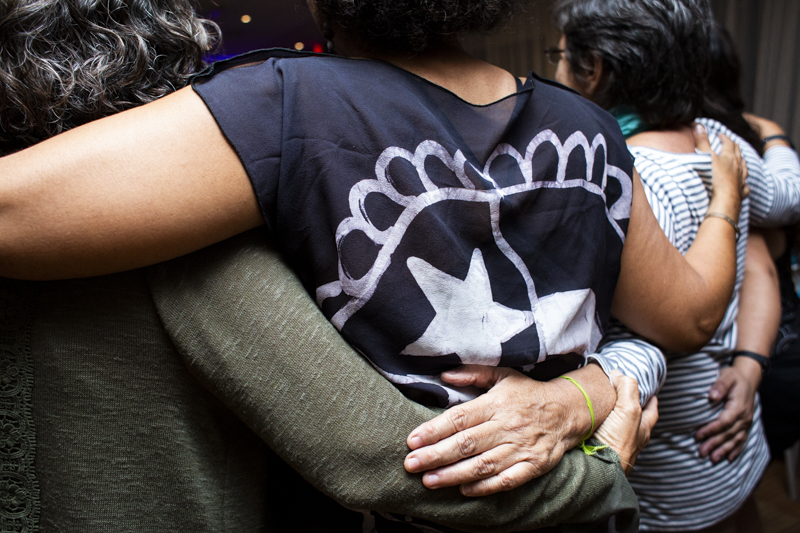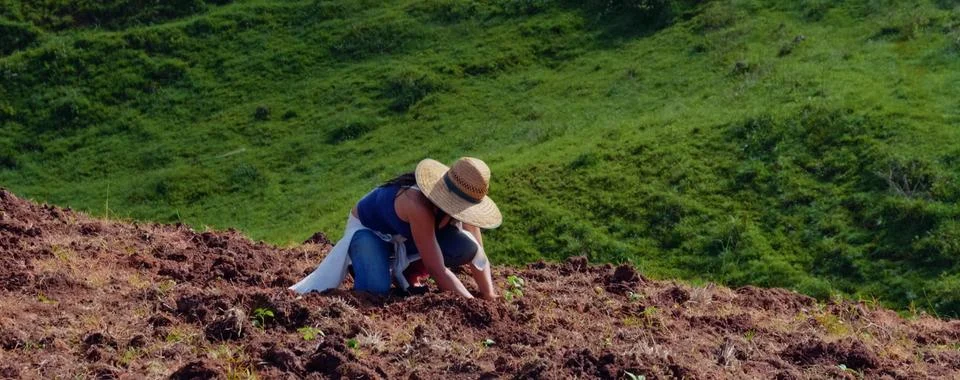

Marco Bello/Reuters
Representatives from the Ford, Mellon, Hispanic, and other foundations gathered in New York in September for a briefing by Open Society Foundations on recovery grants awarded to organizations in Puerto Rico following Hurricane María in 2017. The intention was to rally for sustained interconnectivity between the stakeholders doing the rebuilding in Puerto Rico and the diaspora and its allies advocating for longer-term investment from the mainland. These strategic and effective coordination efforts are largely being driven by women’s networks.
What hadn’t been planned were the flooding, power outages, and water shortages resulting from Hurricane Fiona’s assault on September 18, which added to the infrastructural damage following a period of neglect that saw thousands of households still living under tarps distributed after Maria. Much of the progress made by agricultural collectives was also destroyed by flooding and wind damage caused by Fiona’s passing over the southwest of the main island, where earthquakes and systemic poverty had already made life difficult.
The meeting of the minds in New York was transformed into an opportunity for encouraging newer investments to address the challenges aggravated by a defective electrical grid and Puerto Rico Aqueduct and Sewer Authority (PRASA) infrastructure, which provides tap water to most residents on the main island. The filtration systems PRASA depends on run on electricity, leaving nearly all of Puerto Rico’s residents without electricity and water for a week or more in some cases, sometimes during a heatwave.
Manuela Arciniegas, a program officer with the Ford Foundation’s Civic Engagement and Government team, called for the reversal of centuries of disempowerment through strategic giving. Debt restructuring imposed by a U.S. fiscal board has shuttered schools and slashed pensions for workers such as teachers. The exclusion of Loíza from FEMA’s Fiona relief efforts also sparked outrage in the room, since Puerto Rico’s nexus of Black culture has endured centuries of oppression. FEMA reversed its decision due to activists who advocated for the residents who’ve suffered most—female, Black, and LGBTQI Puerto Ricans.
Women and feminist collectives have pushed to the forefront of community-centered change in Puerto Rico, where “they’ve kept the nation together” despite centuries of discrimination, as expressed by journalist Sandra Rodríguez Cotto in Sandra Guzmán’s 2019 essay “Meet the Women Leading Puerto Rico’s Feminist Revolution.” Women from Brazil to Honduras have risked their lives to fight for Indigenous land rights in the shadows of climate change, land grabbing, and extractive industries. The campaign to force ex-Gov. Ricky Rosselló to resign in 2017 was largely fueled by the momentum sparked by feminist and queer collectives in a united front.


Demonstrators chant and wave Puerto Rican flags during the fourth day of protest calling for the resignation of Governor Ricardo Rossello in San Juan, Puerto Rico July 16, 2019. (Gabriella N. Baez/Reuters)
Mariolga Reyes Cruz is a community psychologist, documentary filmmaker, and social and climate justice activist in Puerto Rico. She holds a PhD in community psychology and qualitative inquiry from the University of Illinois at Urbana-Champaign and has been an active voice in multisectoral coalitions that have organized for social and climate justice. She also spearheaded the founding of the Fideicomiso de Tierras Comunitarias para la Agricultura Sostenible in 2018, the first agricultural community land trust in Puerto Rico’s history, work for which she received an Echoing Green fellowship in 2021.
Her latest documentary, Serán las dueñas de la tierra (2022), was directed by JuanMa Pagán Teitelbaum and follows three ecological farmers struggling to maintain the land they grow food on in Puerto Rico. Reyes Cruz began her presentation at the funders forum by expressing her frustration with the endless “survival mode” that has exhausted residents since long before María struck in 2017—a sentiment shared by others in the room including Frances Medina, a fellow filmmaker and Puerto Rico resident who added that having no access to drinkable water during a tropical heatwave was as dire a human rights violation as it gets.
Xiomara Cara Díaz appealed on behalf of the Maria Fund, which supports an ecosystem of social justice leaders, organizations, and initiatives building power throughout Puerto Rico. She emphasized that those suffering the worst effects of climate change are living in places contributing the least to the crisis as compared to China, Russia, India, and the United States. The Maria Fund has mobilized $7.5 million since 2017 and has awarded 228 grants to 90 organizations based in 50 of 78 municipalities. They’ve also given stipends to more than 30 movement leaders and 50 Black and brown youth as part of this resource distribution.


First meeting of the Maria Fund, December 2018. (Maria Fund/Center for Popular Democracy)
Renata Peralta of Amplify Fund reported how communities are requesting support in wellness and quality of life, which reflects a vacuum in mental health services where austerity and infrastructure failures have spiked rates of depression and anxiety.
Former New York City Council Speaker Melissa Mark-Viverito stressed the effectiveness of supporting the diaspora, where our political muscle resides. She cited the freeing of political prisoners such as Oscar López Rivera and the U.S. Navy’s withdrawal from Vieques as examples of where a united front achieved success.
Glenisse Pagán-Ortiz of Filantropía Puerto Rico added that a shift from photo-op “crisis giving” to meaningful long-term investment for generations to come is overdue. Resources leveraged by the diaspora should go to the men and women working at the frontlines, to ensure that those in need decide how to use funding and support. This shift from “donor-advised funding” to “grantee-advised giving” signals a compelling shift for those of us who work at the crossroads of nonprofits and the philanthropic entities that finance their work.
English has largely replaced Spanish in real estate listings in Puerto Rico to facilitate offshore investment, which drives displacement. Demographic shifts toward white Americans in Rincón have stoked tensions between locals and crypto entrepreneurs who’ve settled there such as Brock Pierce. This liquidating of ancestral lands as natives struggle has inspired activists and leaders to push back. Added to rising seas and infrastructure failure, the future seems dire for Puerto Rico, where colonization and corruption have tested the will of the people for centuries.
That fight continues.
Grassroots International is a public foundation that works directly with frontline communities on social, economic, and ecological justice and equity work. This model of “solidarity philanthropy” seeks to address and reverse root causes of oppression. They’ve distributed over $445,000 in Puerto Rico this year and are awarding $143,000 to grantees such as Instituto para La Agroecología, Investigación y Acción-IALA PR, Colmena Cimarrona (Vieques), IDEBAJO, Coordinadora Paz Para las Mujeres, Ayuda Legal, Agitarte, and Colectivo Ile.
The group’s program officer, Jovanna García Soto, reported that they’ve mobilized $1.7 million for territory defense, land access, and infrastructure for confronting climate change and providing movements with the resources for responding to manmade disasters as alternatives to liberation. Frontline communities perform the work while bypassing a government that has failed. The organizations they’ve backed include Comedores Sociales de Puerto Rico, La Colectiva Feminista en Construcción, Centros de Apoyo Mutuo Jíbaros, La Jornada Se Acabaron la Promesas, Organización Boricuá de Agricultura Ecológica de Puerto Rico, and Casa Pueblo.


This push toward self-determination also includes food and territorial sovereignty and energy independence initiatives that center the needs of the Puerto Rican people in opposition to disaster capitalism’s extractive mechanism. Open Society’s Karina Claudio Betancourt, a resident of Puerto Rico, stressed the need for addressing electoral reforms to reset the political stranglehold that led to thousands of deaths following Hurricane María, for example. Puerto Rico cannot engage in independent diplomacy and commerce when needed, and this must change.
Pledges ranged from Ford’s $1.5 million for recent relief work to Mellon’s $10 million in addition to the $15 million they’ve distributed since 2017. Open Society Foundations pitched in $400,000, adding to the $20 million they’ve given since 2017. Hispanic Federation has awarded $50 million for community kitchens since Hurricane María. For Fiona relief, they’ve added $500,000 in food, water, and supplies to 36 kitchens while also distributing 30,000 solar lamps and installing solar systems at a fishery and resiliency centers.
While $10 million gifts can make a life-saving impact in the short-term, we should push for the redrafting of foundation law in the United States. Private foundations are required to disburse just five percent of their endowments annually, administrative expenses included. They can hoard and invest most of their wealth. If $20 million gifts are feasible at the current five percent legal minimum, think about what a 20 percent or 30 percent minimum could yield.
The investment we need for equitable transformation exists, and portions of that wealth were created by the ancestors of those suffering most today.
***
Charlie Vázquez is a teacher, grant writer, and nonprofit consultant based in New York City, as well as a Latino Rebels founding member. Questions/inquiries: www.charlievazquez.com



[…] post Women’s Networks Drive Puerto Rico’s Decolonization Work appeared first on Latino […]